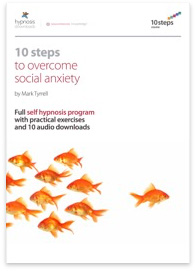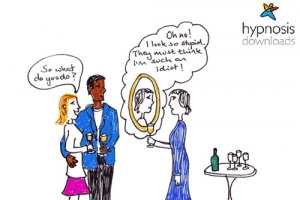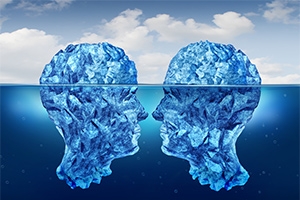Self Consciousness - What Is It Good For?
 "Not so self conscious!" courtesy of Tony the Misfit
"Not so self conscious!" courtesy of Tony the MisfitSound like a strange question to you? Since most parts of a human have evolved to be useful, apart from the appendix, perhaps, what is self consciousness for?
First, let's look at what we mean by self consciousness. Here's an example...
Self consciousness in action
You're standing with a group of friends, happily chatting away, the conversation going along nicely. Then someone says to you, "John, you're good at that, why don't you tell us how you do it?"
And Bang!, the way you feel changes completely. It's as if a spotlight has been turned on you and the rest of the room lights dimmed.
All of a sudden, your cheerful, easygoing nature of 10 seconds ago is nowhere to be found! What happened?
Well basically, your focus of attention has shifted to yourself, otherwise known as self consciousness. You may also have received a shot of adrenaline as a stress response.
Now we have 2 potential problems:
If your adrenaline levels go too high, your brain will cease functioning in a way that allows you to think clearly, and you will feel like running away. Obviously not what is needed for a social situation!
If your focus of attention gets 'stuck' on yourself, i.e. in self consciousness mode, you won't be able to discuss the topic you've been asked to talk about. High adrenaline levels will make it more difficult for you to shift your focus away again.
What is self consciousness for?
Strangely, the ability to be self conscious may well help in socialising, in the long run. To be good socially, we need to be able to empathise with others. And to do that, we need to put ourselves in others' shoes.
When you do this, you imagine being them and then check how you would feel if you were in their position. So, you are using self consciousness for a good reason, rather than self consciousness using you!
So what can you do about self consciousness?
OK. Well let's look at the adrenaline first. If you're getting this sort of stress response then it would be wise to learn some relaxation techniques, for 2 reasons:
Used correctly, relaxation will 'decondition' your anxiety response. To explain - if you are reacting with anxiety very quickly in this sort of situation, it may be because you have had similar experiences in the past, and your body has learnt to respond this way, faster than you can think.
There are 2 main things to do:
- Rehearse the situation whilst deeply relaxed, so that your brain learns a new response.
- Create a 'trigger' to allow you to 'fire off' your relaxation response when you need it most.
You can do this best by learning how to relax very deeply. If you do meditation, or yoga, you probably already know how.
Once you know how to relax quickly in the situation itself, your anxiety response will soon stop occurring at all. You will also have the reassurance of knowing you can calm yourself if need be, further increasing your self confidence.
Now let's look at your focus of attention.
As we discussed above, self consciousness is the state of mind that occurs when your focus of attention is on yourself. But to talk smoothly about a subject, your focus needs to be on the subject! The more deeply focused on the subject you are, the more eloquent and flowing you will be.
So, self consciousness gets in the way of socialising because it stops you focusing on what you need to focus on: the topic of conversation.
Self consciousness tips
So what can you do to change your focus of attention?
A few things
- The first thing to understand is that adrenaline and anxiety 'lock' your attention, making it more difficult to switch what you're focusing on. Why? Because if it was a truly dangerous situation (which is what this response evolved for, it would be no good if you just drifted off and started thinking about what was for dinner!)
So, becoming calmer will make it much easier to change your focus when you need to.
- Learn a discipline such as self hypnosis, tai chi, autogenics, or meditation. This all focus around teaching you to become calmer, and involve taking deliberate control of your focus of attention.
- Practice switching your focus of attention on a day to day basis. You can do this whilst walking, sitting at work, anywhere really. Simply focus in on one thing as tightly as you can, then switch to something else. They could be objects in your environment, or ideas or thoughts.
- It's particularly good if you do this whilst a little emotionally stimulated, such as watching an exciting TV program, or a film at the cinema. At the most tense moments, deliberately switch your attention away, and don't allow yourself to switch back until you have focused fully on the new object or thought.
These tips will make it much easier to control self consciousness. It may not happen all at once, but you will notice the difference if you persevere.
10 Steps to Overcome Social Anxiety course
If just the thought of small talk makes you nervous, and social situations make you feel ill, then read on to find out how you can become socially confident and relaxed...
Get a free hypnosis session with our new Social Anxiety app for iOS & Android:
Includes our most popular social anxiety session free, with the option to upgrade to 10 more sessions.
Get the Social Anxiety app for iOS (iPhone or iPad) here or for Android here.










